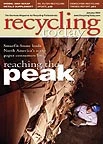Nickel alloys are in demand, while aircraft orders could help titanium take off. It appears as if the atmosphere for specialty metals is improving.
The aerospace industry is the bull in the high-temp and titanium alloy markets. If aerospace is asleep, any bull market in specialty metals is dead to the world, too.
But put a bit of spark into aircraft, and the bull starts shaking in the specialty metals market.
Like Sleeping Beauty, the airline market fell asleep on September 11, 2001, and the sleep has since grown deeper. Finally, in Q4 of 2003 the titanium market started to show life.
Even better, the nickel business is flying high, and most observers expect it to continue for the foreseeable future.
TURBULENT SKIES. "The airline industry and how it will operate in the future has changed dramatically," says Stuart Freilich, president and CEO of Universal Metal Corp., Worcester, Mass. "[Aircraft orders] will not revert back to past levels for many years to come, if at all," he remarks. Universal is a wholesaler to the trade, with 80 percent of its scrap coming from scrap dealers around the world and the balance from large generators.
| After the Fire |
|
Like the phoenix, rising whole out of the fire, Universal Metal Corp. of Worcester, Mass. is back to full speed after a blaze destroyed 25,000 square feet of processing space.The fire that ruined about 40 percent of Universal’s plant occurred in the titanium processing operation area during the fall of 2001. That disaster is history now. "We’re into a brand new building and everything is out of sight," says Universal’s President and CEO Stuart Freilich. When the fire ripped through the company’s three-acre specialty metals recycling facility, the insurance company responded promptly and helpfully. "The insurance company was very accommodating," Freilich says. "I only wish the contractors were as responsive. We ended up firing two architects, a plumber and an electrician," he continues. Universal serves a select universe of vacuum melters and specialty melters whose alloys are often sold to the aerospace industry. Both Universal and its customers were eager to get back to business. However, some of the contractors hired to re-build the facility seemed to have problems meeting deadlines. Neither Freilich nor trader Robert Rappaport had time for that. "Everything is back to normal," Freilich says.As an approved processor of vacuum-prepared high-temp alloys, titanium and refractory scrap metals, Universal’s shipments go to vacuum melters along the Atlantic seaboard and as far away as Asia.Business is perking along and the new facility is the pride and joy of the yard. "It’s a wonderful building," Freilich says. The tumult caused by the fire is now just a memory. Today, the company has a 90,000-square foot facility."Thank God that’s all behind us," Freilich concludes. |
Nobody says the aircraft business is dead, but it will be a while before aerospace, and the related titanium scrap market, gets back to full speed. Nonetheless, it is moving ahead. Colin Stuart, vice president of marketing for Airbus, predicts air travel will continue to grow at 4.7 percent per year. At the same time, airlines already have reduced capacity by about 8 percent industry-wide.
The early December announcement that the U.S. Government has halted an $18 billion order for 100 planes from Boeing will not help the market. The loss of the huge order for 767s was in light of ethics considerations, but the move had a chilling effect on everyone dealing with scrap. Government and Boeing officials say the deal is on hold, not dead.
Before the news about Boeing, several observers were on record saying they expected the titanium market to be up a quarter or more by spring. Whether the halt of the government’s order for Boeing’s 767 refueling tankers, produced in Wichita, Kan., dampens or only delays a boost remains to be seen.
Optimistic voices are in the mix. Bruce Glant, president of Pacific Iron & Metals Corp., Seattle, says, "Everyone on the consumer and broker side sees prices up in the first and second quarter," he says. "I wouldn’t be surprised if prices were 30 to 50 cents higher by April," Glant says.
With that kind of optimism for 2004, it is not surprising that a number of recyclers wondered whether to keep material on the books at the end of the year and wait for better prices or to hedge bets and move scrap out on upticks and hope flow continues strong into 2004.
PRECIOUS THINGS IN SMALL PACKAGES. One major market for titanium is moving to a new, though smaller, product that is in demand. Airlines want small, regional jets. Note "regional" is a relative term: Continental flies its regional jets from Denver to Cleveland, a route of more than 1,200 miles. Continental has pushed back delivery of 36 of its 56 Boeing 737s until 2008 and cancelled all but four of the 757s it ordered.
In Europe, Airbus projects that narrow-body jets will be 82 percent of the market in the coming 20 years, with the rest going to wide bodies.
Randy Baseler, vice president of Boeing’s Commercial Air Division, sees 60 percent of aircraft being narrow-body jets, 20 percent being mid-sized and only 4 percent of the market going to 747 or larger products. He sees demand for 24,000 new aircraft during that timeframe.
For 2004, Boeing has firm orders for 248 planes and expects to ship 280 commercial aircraft this year, mostly narrow bodies. Airbus expects to deliver 300 airliners in 2004, the same as 2003. The bulk of the shipments will be the narrow-body A320s by a 10-to-1 margin.
Newcomer JetBlue has ordered 100 regional-size Embraer 190s. US Airways bought 170 regional jets from Bombardier. Meanwhile, Northwest downsized its capacity by an additional 1.6 percent on top of earlier 15 percent reductions.
David Calhoun, CEO of General Electric Co.’s aircraft engines units, does not project a recovery until 2006. Still, he says that the market has hit bottom.
Freilich gathered and studied all of those figures. "Based on (these) predictions, we should see an increased demand for scrap, due to the lead times required as well as production for military programs, in late 2005," he says.
He notes that combining reduced capacity with the number of aircraft currently in storage, it is going to be a long, cold spell for aircraft production and, with it, slack production of titanium revert scraps and vacuum-grade nickel-based alloys.
Freilich says the titanium market this year was "very interesting." He notes that the year opened up with optimism only to fizzle in May for no apparent reason. "Business apparently did not develop as expected," he notes.
Early in 2003, it was a seller’s market for both revert quality and ferro-quality titanium scrap. Then, in June, the doors shut tight at many of the mills and the market slumbered until the fourth quarter, when the ferro-titanium market firmed and showed signs of coming on strong again.
"Russian titanium producers, being the low cost producers, have a major impact on the world market and already have about 30 percent of the American titanium market," Freilich says.
"The Russian titanium producers will make it impossible to sustain the current number of western titanium producers," Freilich predicts. "Someone will have to go."
While there is hope for an upswing in the auto and construction markets, optimism is mixed about aerospace in the short-term. For airlines, the trend looks favorable for operators who use the right aircraft.
Freilich gathered statistics that show an airline can break even filling 60 seats on a small plane, while break-even on an Airbus A-320 would be 119 seats. JetBlue’s Embraer 190s cost 15 percent to 20 percent less to operate than a Boeing 737-600. In June of 2003, regional jets were used for 36 percent of all U.S. domestic flights, up from 19 percent in 2000. Use of narrow-bodied jets fell from 71 percent to 57 percent during the same time.
NICKLE SHINES. While titanium could be hit-or-miss, the market for nickel-based products is as shiny as a new sheet of stainless steel.
"The market’s good," remarks Jerry Turchin, president of California Metals & Electronics in El Cajon.
"I think 2004 will be a very good year in the ferrochrome market," agrees Larry Pryor, Sudamin Corp., Sewickley, Pa.
"Ferrochrome prices are going up," Pryor continues. The stainless steel market is gathering its strength from the automotive and the construction sectors. Pryor expects both areas to be strong throughout 2004.
"Nickel-based scrap enjoyed good demand at the start of 2003, only to falter in the beginning of June," Freilich says. "The vacuum melters delayed shipments of scrap or canceled orders entirely due to canceled orders and stretch-outs from their customers."
"I anticipate some spotty business starting in late first quarter, extending into the second quarter then more of the same afterwards," Freilich says. Overall, he predicts 2004 will be a repeat of 2003, with the exception of the ferro-titanium grades.
Fred Knox, president of The Mercer Co., Warren, Ohio, agrees nickel and stainless steel prices are going up nicely, but he says that the boost is more thanks to the underlying commodities going up than to conditions in the scrap market.
"Stainless scrap prices will be fine as long as the U.S. dollar is under pressure," Knox says. "The world situation is following the copper markets and even gold to some extent," he adds. Knox says that he does not see any strengthening of the U.S. dollar until the government allows interest rates to increase. "That is not happening soon."
For a scrap dealer like Knox, the important thing is that material is moving.
"We are working on margins. Like everyone, we would like to see some stability. Right now it is hard to project how the market will go. No one wants to get stuck with material. Everyone is playing it as close to the bone as they can," Knox says.
Turchin agrees. "I don’t question the reasons (for the up market). We’re just going to go with the flow.
"We’ve had enough tough times so this chance to balance up helps," Turchin adds. His company handles more nickel and stainless than titanium, so the market upturn was a nice way to finish 2003.
Pryor is even more optimistic about 2004. "I see things improving. I see the market strengthening," Pryor states.
The author is a Recycling Today contributing editor based near Cleveland who can be contacted at curt@curtharler.com.
Get curated news on YOUR industry.
Enter your email to receive our newsletters.

Explore the January 2004 Issue
Check out more from this issue and find your next story to read.
Latest from Recycling Today
- Toppoint Holdings expands chassis fleet
- Lego creates miniature tire recycling market
- Lux Research webinar examines chemical recycling timetables
- Plastics producer tracks pulse of wire recycling market
- Republic Services, Blue Polymers open Indianapolis recycling complex
- Altilium produces EV battery cells using recycled materials
- Brightmark enters subsidiaries of Indiana recycling facility into Chapter 11
- Freepoint Eco-Systems receives $50M loan for plastics recycling facility





